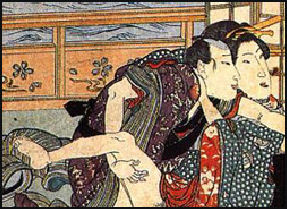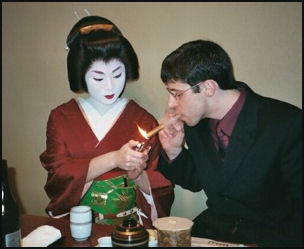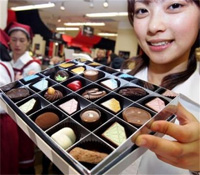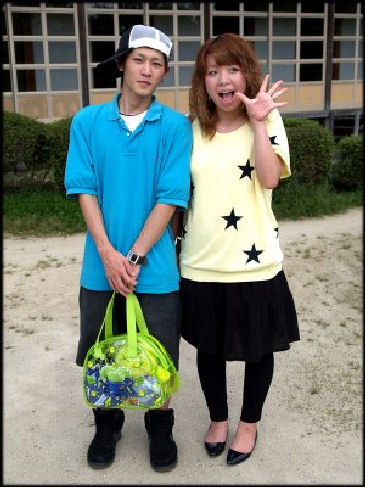LOVE IN JAPAN

It has been said that there are more words for rice in Japanese than for love and that the Japanese language has no equivalent of "I love you." One market researcher told the New York Times, "Traditionally Japan is an unromantic country, and people don't express love — so they buy expensive presents. That's an exaggeration, but you get the point."
Love has traditionally been regarded as disruptive to social harmony and in the past was sometimes more likely to occur between a prostitute and her customer than between husband and wife. Japanese literature has more stories about love between unmarried couples than married ones. There are also lots of double suicide stories involving geishas and their lovers.
When asked why Japanese don’t t really express their love verbally a Japanese teacher wrote in the Daily Yomiuri, “Well, we would not say such a thing because it is something we should feel intuitively rather than express verbally. Once we say it, it sounds rather cheap.”
But despite this Japanese television dramas are full couples confessing their love. They often feature a male and female who are infatuated with each other, but nothing romantically happens until one confesses his or her love for the other. It also happens in real life. In one famous incident a member of a baseball team than won a big game climbed a pole and expressed his love for a particular women. The woman played along but later politely rebuffed him, when attention was not focused on them.
In a study on jealousy, Japanese men ranked the least jealous and Brazilian men ranked as the most. In a study on friendship Japanese ranked their “best friend” as being closer to them than “a lover.” A study of women in Europe, Japan and the Philippines asked them to fill out forms that measured their experiences of passionate love. Women from all three places said they felt love with the same level of intensity.
Links in this Website: MARRIAGE IN JAPAN Factsanddetails.com/Japan ; DATING IN JAPAN Factsanddetails.com/Japan ; JAPANESE WEDDINGS Factsanddetails.com/Japan ; DIVORCE IN JAPAN Factsanddetails.com/Japan
Good Websites and Sources: Street Directory.com streetdirectory.com ; Various Topics on Japan Forum japaneselifestyle.com.au/japanforum ; Charisma Man cnn.com ; Middle Aged Guys japantimes.co ; Japanese Legends About Supernatural Sweethearts pitt.edu/~dash/japanlove
Sixty-One Percent of Unmarried Japanese Men Have No Girlfriend
In November 2011, Kyodo reported: “A record-high 61.4 percent of unmarried Japanese men aged between 18 and 34 have no girlfriend, up 9.2 percentage points from 2005, a survey by the National Institute of Population and Social Security Research said. The percentage of unmarried women with no boyfriend in the same age group also hit a record high of 49.5 percent, up 4.8 percentage points, while nearly half the respondents of both genders said they do not want to date anyone, the research organization said. [Source: Kyodo, November 26, 2011]
Asked why they remain unmarried, 13.5 percent of men and 11.6 percent of women aged between 25 and 34 said they do not know how to be in a relationship, and 11.9 percent of men and 7.0 percent of women aged between 18 and 24 gave the same answer, the institute said. Meanwhile, a solid majority of respondents said they are willing to get married, with 86.3 percent of men and 89.4 percent of women answering they want to get married at some stage. Asked about whether they want to wed within a year, 43.3 percent of men and 53.2 percent of women said they want to or would if they find someone suitable, both logging record highs, it said.
The survey is conducted every five years to grasp singles' attitudes toward marriage and relationships. The latest survey, the seventh of its kind, was conducted in June last year, and analyzed answers from about 7,000 people among some 10,000 respondents.
Displays of Affection in Japan

Geisha with Western customer Asian couples don't usually express affection towards each other in public. Public displays of affection between members of the opposite sex’such as kissing, hugging and holding hands — are considered rude. Even families rarely touch, hug or display physical affection in public. Most school children have said they have never seen their parents kiss.
Holding hands and hugging among members of the same sex is perfectly acceptable although this practice is less common in Japan than other Asian countries. It is not unusual for a pair of women to walk down the street holding hands or for men to embrace one another and arm.
It has traditionally been considered taboo to touch the nape of a girl's neck. After World War II, kissing wasn't allowed in Japanese films. The first celluloid kiss took place in 1946 and the actors that did it were so nervous about it they put a piece of gauze between their lips.
Japanese couples are starting to kiss more in public. Young people can be seen embracing in the parks and wives sometimes kiss their husbands goodbye at train stations. One Japanese baseball team even offered reduced rate tickets to anyone who was willing to kiss outside the box office.
The Japanese word used by the older generation to describe a kiss literally translates to "approach the lips." Most young people say "kee-su," the Japanese pronunciation of the English word "kiss," or "choo" or "choo-choo," the sound a kiss makes to Japanese ears.
Sentiments About Kissing in Public in Japan
But not everybody is happy about the trend towards more public displays of affection. "Kissing in public — it's ugly!" a social critic complained in a popular magazine. "these people never give a thought to how others feel, the people who have to see them do it." A housewife echoed these sentiments in the Yomiuri Shimbun: "These young people have lost their sense of shame. Without shame, there is no sense of restraint. If we lose that, we're no different from animals."
A Japanese educator told the Washington Post, "kissing in public is less shocking nowadays than it would have been, say, 40 years ago. But it's still not accepted. There's a view that this is a sign of weakness. People see young people who do it as weak."
In a survey of 400 men, 71 percent of them said they never had kissed a woman in a public place. Of those who said yes more than half said they were embarrassed when they did it. A 27-year-old career woman told the Washington Post that kissing on a street corner seemed to be "a natural beautiful thing" but when asked if she had ever done it she replied: "No comment."
Dating in Japan

Dating in the Western sense of the word wasn't really practiced in Japan until 1950s. Before that boys and girls were kept separate in school and had few opportunities to socialize. Marriages were mostly arranged.
The idea of dating was introduced by American servicemen who arrived in Japan in large numbers after World War II and began dating local girls. This coincided with a diminishing role of Confucian values which required children to do what their parents told them (in this case agreeing to an arranged marriage) and allowed them to pursue their own desires. Dating didn't really catch on until the 1960s when Japanese society became affluent enough to allow people to spend money on entertainment.
Romances usually take place outside the home because there is no space or privacy in family homes. Couples go to the movies, restaurants, theme parks, the beach and nightclubs. For sex they have to check into a love hotel. Many Japanese are still very shy and don't date.
Japanese sometimes get confused about meaning of “friend,” “girlfriend and “boyfriend.” Young women often say they have lots of boyfriends when they mean to say they have a lot of friends.
The sociologist Chizuko Ueno has described Japan’s subculture — where otaku (nerd) men and otaku women live in completely different and closed worlds of sexual fantasies — as being based on its “sex segregation culture” rooted in all-girl schools and all-boy schools as opposed to the “couple culture” found in the United States.
Speed dating has become popular in Japan. Under the system men and women are seated across from one another for, say, three to five minutes to chat and scope each other out until a bell rings and the men move on to new potential dates. The participants have numbers. If one person likes someone they can request a date and if that designated person agrees then they can go out on a formal date.
For women to aggressively pursue men is considered not very ladylike and frowned up.
Dating, Christmas Eve and Valentine’s Day in Japan

Valentine's Day candy Christmas Eve evening is regarded as a romantic time in which boyfriends spend up to $1,000 on a night in a fancy hotel and dinner in a fancy French or Italian restuarant. One 29-year-old teacher told the New York Times, "For a guy, Christmas is the best chance to get a girl into his hands. No girl would turn down a restaurant dinner and a Christmas present. Of course, she might not want to go all the way to the hotel room." Japanese girls generally expect their suitors to spend $400 or $500 on a present like a Prada handbag, plus the dinner and perhaps the hotel room.
Reservations need to be made months in advance at popular restaurants and hotels. Disneyland and Universal Studios are also popular destinations. Reservations are needed there too.
Valentine's Day, February 14, is a very big holiday in Japan. In an unusual twist Japanese women give chocolate to men, who return the gesture a month later by presenting white chocolates to women on "White Day."
Dating and Technology in Japan
The big fad among schoolboys and schoolgirls and young men and young women in 1998 were Lovegetys, palm-size beepers with a range of about 15 feet that could used to send a "love beep" to someone nearby with a similar devise. The $22 gadget was trumpeted as a way for notoriously shy Japanese to meet members of the opposite sex.
Ideally the device worked like this: a guy is in a park sees an attractive girl so press his Lovegety (as in "get love") to send a love beep to the girl. of the girl doesn't have a Lovegety he is out of luck. But if she has one, and she sends back a beep, that means she is open to suggestions, all they have to do next is talk to one another. Needless to say the idea never really caught on.
Some have suggested that cell phones have made it easier for teenagers and young men and women to set up dates. Many Japanese school kids meet people by randomly dialing numbers on their cell phones. School kids often stick their parents with $100 to $200 a month phone bills.
Dating Games, Love Plus and Princess Maker
Dating simulation games have been compared to “shojo” manga (girls comic books) or Harlequin romances except that players can interact with the story deciding which way the plot will evolve or what will happen to a particular character. The target audiences of the games are teenage girls and young women but the games, it is hoped, will also appeal to middle-age women as the shojo manga do.
“Duel Love” is a virtual boyfriend game by Bandai in which the tip of a stylus becomes a hand grasping a wash cloth that can be used to wipe sweat from the torso of reclining virtual body. “Harukanaru Toki no Naka de” (“In Distant Time”) is a fantasy series in which a modern high school girl travels to another world, where she becomes a shrine maiden fighting along side eight male characters protecting a city resembling Kyoto.
“Angelique” is game with characters designed by cartoonist Kairo Yura.. In it high school girls have been nominated to be queen of a cosmos and the player, as one of the girls, competes against rivals to prove her governing skills with help of nine cute male guardians. The player tries to become queen and gets romantically involved with one of the guardians.
Companies that make these games hope to not only make money from the games themselves but also from spin-off comics, merchandise, CD audio dramas, TV animes, films, plays, radio broadcasts and live events,
Creepy Japanese computer game popular in the 1990s included Princess Maker, a game in which a beautiful 10-year-old girl is adopted by a "father" (the game player), who can order her to anything he wants, even sunbathe in the nude; Tokimeki Memorial, a game in which a player can win the girl of his dreams in an imaginary high school by performing tasks that require at least 15 hours of game-playing to fulfill. Princess Maker was introduced in 1991 and had sold more than 200,000 copies by 1996.
Psychiatrist and game therapist Rika Kayama told Time, "These types of games appeal to the majority of men today who don't fit into society where one has to be handsome and outgoing to attract girlfriends."
On playing the girlfriend game “ Love Plus “ otaku columnist Kanta Ishida wrote: “the real fun starts...as soon as you get a girlfriend...The game begins to work in concert with the built-in calendar of the DS device, allowing a player to spend every day with his new girlfriend...The key to becoming closer to her is to have more conversations with her and to learn to kiss her well but only with a stylus. (You might be smirking now, but, believe it or not, it really does make you heart beat faster).”
“The girlfriend, in fact, is more dedicated than a real one would be. She changes her clothing and hairstyle depending in ger boyfriend’s tastes. Her character also changes according to the way he treats her...because sometimes she asks you to literally speak words of love, using a built-in microphone. It is no wonder some married men claim they are unable to play it at home.”
Dating Schools in Japan
Japanese men are not very skilled at dating picking up women. There are special courses for men that teach them how to get a date, how to interact with women once the dating process has begun and how to keep the relationship going after it has started. The classes offer tip on how to dress and make conservation. Some are oriented towards finding a wife.
Among the dating schools for men are the School of Bridegrooms in Nagoya and Pickup Technique Cram School for Unpopular Men in Tokyo. Some have classes run by “pickup professionals.” Others runs tours of potential pick up spots, often cafes frequented by young office ladies. Student have said some of the classes are led by men who lecture them and berate them for being too shy.
Match Makers and Dating Services in Japan

A 2006 survey found that 600,000 people had sought the help of marriage counseling services that year, a sign that people want help finding a marriage partner.
One Japanese matchmaker told the Washington Post, "It could take years to meet the right person if you let it happen naturally. I shorten the process." She added that people who meet naturally often find that background difference make it difficult for them to get married. [Source: Mary Jordan, Washington Post]
When asked to share her secret for finding the perfect she said, "When it come to compatibility there are the 'big three': father's occupation, job and educational background." As far as looks are concerned, she said, "people with round faces marry people with round faces and those with long faces like others with long faces."
The O-net computer dating service charges as much $3,000 to allow single people to tap into their database of 63,000 eligible men and woman. There are also special matchmaking services for people with disabilities.
Some matchmaking services are oriented towards parents who are anxious to get their grown kids out of the house. Many of these “kids” are on their 30s. Some are in their 40s.
Increasing men and women are meeting each the through cooking classes and matchmaking-service-sponsored golfing events. The cooking class cost about $50 for women and $60 for men, with a man and a woman teamed together and given the task fo making a cheese puff or some such thing. “Matchmaking golf” events cost between $100 and $200, including green fees
Company and Government Dating Services in Japan
Some matchmaking services are run by companies for their employees. The Washington Post interviewed a couple, whose marriage was arranged by the Tie the Knot office of the Hitachi Insurance Service in Tokyo. The man, a Hitachi employee named Shigemitsu Tanaka, went to office in 1985 and filled out at a questionnaire about his education and interests and attached a picture. Ten years later another Hitachi employee, Keiko Tomizawa. took a look at Tanaka's file and said she was interested in meeting him.
Tomizawa’s picture and resume were sent to Tanaka, who agree to go on a date with her arranged by a matchmaker from the Tie the Knot office. Tanaka and Tomizawa had lunch. The lunch lasted for four hours and stretched into dinner. After dating for one year they were married.
Local governments are increasing get involved in matchmaking as part of the effort to get people married as way of tackling the declining birthrate problem. The Gunma Prefecture government sponsors regular meetings for people seeking partners at hotels. Yamanashi Prefecture government conducts lectures on dressing and speaking properly. Nara Prefecture hold 30 to 40 events for singles a month. Saga Prefecture abandoned its efforts in 2004, citing “no tangible results.”
Breaking Up Services in Japan
“Wakaresaseya”, literally “breaker-uppers,” are specialists in breaking up relationship, particularly between husbands and mistresses, and getting rid of unwanted lovers and spouses. Operated in a gray area between legality and illegality, they generally charge between $5,000 and $20,000 per job, with some complex jobs costing $150,000, and rely on unlicenced agents to do the dirty work. Thee are several dozens firms, most of them in Tokyo and Osaka, that do the jobs and the earn ten of millions of dollars a year. [Source: Mark Magnier, Los Angeles Times, January 21, 2003]
Many of the cases are aimed at getting rid of a mistress of putting pressure on a husband through entrapment. In a typical case an agent for the wakaresaseya meets “the target” by chance at a bar and strikes up a conservation with him. Before long they are in bed together, with either video or audio tape recording it all. The tapes are then used to blackmail the husband to give up the affair or are shown to the mistress.
Wakaresaseya companies claim they have a 95 percent success rate. Other techniques employed include threatening to disclose embarrassing financial or legal information to employers or parents, giving targets embarrassing sexually-transmitted diseases, drugging them and putting them in compromising situations, addling the targets with massive debts or simply buying them off.
Many of the agents are wannabe actors or professional that want to add some excitement to their life. They are trained in martial arts, role playing and the limits of the law. Good agents are patient, calm under pressure and think on their feet and improvise quickly
Image Sources: 1) Japan Visitor 2) Liza Dahlby's Geisha website 3) Andrew Gray Photosensibility 4) Japan Zone 5) Ray Kinnane
Text Sources: New York Times, Washington Post, Los Angeles Times, Daily Yomiuri, Times of London, Japan National Tourist Organization (JNTO), National Geographic, The New Yorker, Time, Newsweek, Reuters, AP, Lonely Planet Guides, Compton’s Encyclopedia and various books and other publications.
Last updated July 2011
